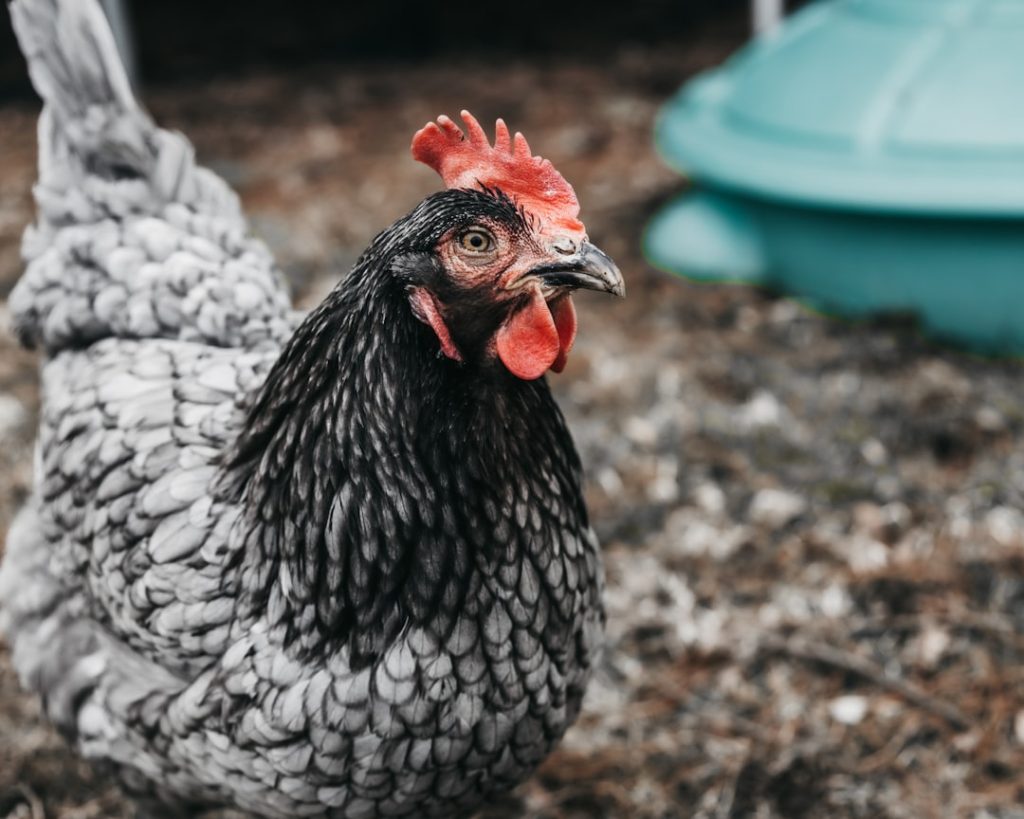Maintaining a cool environment for chickens is essential for their health, productivity, and overall well-being. Chickens are particularly vulnerable to heat stress due to their lack of sweat glands, relying instead on panting and wing-spreading to regulate body temperature. Prolonged exposure to high temperatures can result in heat stress, leading to decreased egg production, stunted growth, and potential mortality.
Chicken owners should be aware of heat stress indicators, including panting, lethargy, reduced feed consumption, and drooping wings. Proactive measures to keep chickens cool are crucial for preventing these issues and ensuring flock comfort. The importance of cooling extends beyond physical health to encompass chicken welfare.
Heat stress can cause discomfort and distress, potentially leading to behavioral problems such as aggression, feather pecking, and reduced social interaction. By prioritizing temperature management, owners can maintain a content, active, and productive flock. Understanding and implementing effective cooling strategies is fundamental to responsible poultry management and ensures the overall well-being of chickens.
This knowledge is crucial for both small-scale backyard flocks and large commercial operations.
Table of Contents
- 1 Providing Adequate Shade for Chickens
- 2 Ensuring Proper Ventilation in the Chicken Coop
- 3 Offering Cool and Refreshing Treats for Chickens
- 4 Providing Access to Fresh and Cool Water
- 5 Using Cooling Methods such as Misters or Fans
- 6 Monitoring and Managing Heat Stress in Chickens
- 7 FAQs
- 7.1 What are some ways to keep chickens cool in hot weather?
- 7.2 How important is it to keep chickens cool in hot weather?
- 7.3 What are signs that chickens may be suffering from heat stress?
- 7.4 Are there specific breeds of chickens that are better suited for hot weather?
- 7.5 Can I give my chickens ice water to help keep them cool?
Key Takeaways
- Keeping chickens cool is crucial for their health and well-being, especially during hot weather.
- Providing adequate shade in the chicken coop helps to protect chickens from direct sunlight and heat.
- Proper ventilation in the chicken coop is essential for maintaining a comfortable and cool environment for the chickens.
- Offering cool and refreshing treats, such as fruits and vegetables, can help chickens stay hydrated and cool.
- Access to fresh and cool water is vital for chickens to stay hydrated and regulate their body temperature.
Providing Adequate Shade for Chickens
Creating a Comfortable Outdoor Environment
One of the most effective ways to keep chickens cool is by providing adequate shade in their living environment. Shade helps to reduce the direct exposure to sunlight and lowers the ambient temperature, creating a more comfortable space for chickens to rest and move around. Natural shade from trees or shrubs can be utilized in the chicken yard, while artificial shade structures such as tarps or awnings can be installed over the coop and run.
Ensuring Proper Ventilation
It is important to ensure that the shade is well-ventilated to allow for air circulation while still providing protection from the sun’s rays. This can be achieved by installing vents or windows in the shade structures to promote airflow.
Shaded Areas within the Coop
In addition to outdoor shade, it is also beneficial to create shaded areas within the chicken coop itself. This can be achieved by positioning the coop in a location that receives minimal direct sunlight during the hottest parts of the day or by installing reflective roofing materials to reduce heat absorption.
Reducing the Risk of Heat Stress
By providing ample shade both outdoors and indoors, chicken owners can significantly mitigate the risk of heat stress and create a more comfortable living environment for their flock.
Ensuring Proper Ventilation in the Chicken Coop

Proper ventilation is essential for maintaining a cool and comfortable environment within the chicken coop. Good ventilation helps to remove excess heat, moisture, and airborne contaminants from the coop, promoting air circulation and reducing the risk of heat stress. Ventilation can be achieved through the use of windows, vents, and fans, which allow fresh air to enter the coop while expelling stale air.
It is important to position vents and windows strategically to facilitate cross-ventilation and prevent the buildup of heat in specific areas of the coop. Furthermore, maintaining proper ventilation is crucial for controlling humidity levels within the coop, as high humidity can exacerbate heat stress in chickens. By ensuring adequate airflow and ventilation, chicken owners can create a more comfortable and healthy living environment for their flock.
Regular inspection and maintenance of ventilation systems are essential to address any obstructions or malfunctions that may compromise airflow and temperature regulation within the coop.
Offering Cool and Refreshing Treats for Chickens
In addition to providing a cool living environment, offering cool and refreshing treats to chickens can help them regulate their body temperature and stay hydrated during hot weather. Treats such as frozen fruits and vegetables, chilled watermelon or cucumber, and ice cubes can provide chickens with a refreshing source of hydration and nutrition. These treats not only help to cool chickens down but also serve as enrichment activities that keep them engaged and entertained.
Furthermore, incorporating electrolyte supplements into the chickens’ diet can help replenish essential minerals lost through panting and sweating, supporting their overall health and well-being during periods of heat stress. By offering a variety of cool treats and supplements, chicken owners can ensure that their flock remains nourished and hydrated while enjoying relief from the heat.
Providing Access to Fresh and Cool Water
Access to fresh and cool water is paramount for keeping chickens cool and hydrated in hot weather. Chickens require a constant supply of clean water to regulate their body temperature through drinking and panting. It is essential for chicken owners to regularly check water sources for cleanliness and temperature, as water that is too warm can discourage chickens from drinking an adequate amount.
To maintain cool water temperatures, waterers can be placed in shaded areas or equipped with ice packs or frozen water bottles to lower the temperature of the water. Additionally, using automatic waterers or drip systems can help ensure a continuous supply of cool water throughout the day. By prioritizing access to fresh and cool water, chicken owners can help their flock stay properly hydrated and resilient against heat stress.
Using Cooling Methods such as Misters or Fans

How Cooling Methods Work
Misters release fine water droplets into the air, creating a cooling effect as the water evaporates. Similarly, fans help circulate air within the coop, dissipating heat and maintaining a comfortable environment for the flock.
Optimizing Placement and Timing
When using misters or fans, it is essential to consider their placement and timing to maximize their effectiveness. Misters should be positioned in shaded areas to prevent excessive moisture buildup in direct sunlight, while fans should be strategically placed to promote airflow without causing drafts or discomfort for the chickens.
Creating a Comfortable Environment
By implementing these cooling methods, chicken owners can create a more pleasant living environment for their flock during hot weather. This can lead to healthier, happier chickens that thrive even in the warmest temperatures.
Monitoring and Managing Heat Stress in Chickens
Monitoring and managing heat stress in chickens is essential for preventing adverse health effects and ensuring the well-being of the flock. Regular observation of chicken behavior, such as panting, wing spreading, or reduced activity, can help identify early signs of heat stress. In response, proactive measures such as providing additional shade, cool treats, or adjusting ventilation can be taken to alleviate heat stress and promote comfort.
Furthermore, it is important for chicken owners to be prepared with a heat stress management plan that includes emergency measures in case of severe heat waves. This may involve relocating chickens to a cooler area, providing access to ice baths or cold packs, or seeking veterinary assistance if necessary. By staying vigilant and responsive to signs of heat stress, chicken owners can effectively manage the impact of hot weather on their flock’s health and well-being.
In conclusion, keeping chickens cool is essential for maintaining their physical health, welfare, and productivity. By understanding the importance of providing shade, proper ventilation, cool treats, and access to fresh water, chicken owners can create a comfortable living environment that supports their flock’s resilience against heat stress. Implementing cooling methods such as misters or fans further enhances the ability to mitigate high temperatures and ensure a pleasant experience for chickens during hot weather.
Through proactive monitoring and management of heat stress, chicken owners can safeguard the well-being of their flock and promote a thriving poultry community.
If you’re looking for ways to keep your chickens cool during the hot summer months, you may also be interested in learning about the Producers Pride Sentinel Chicken Coop. This coop is designed to provide a comfortable and safe environment for your chickens, helping to keep them cool and protected from the heat. Check out this article on Producers Pride Sentinel Chicken Coop to learn more about how it can benefit your flock.
FAQs
What are some ways to keep chickens cool in hot weather?
Some ways to keep chickens cool in hot weather include providing shade, ensuring proper ventilation in the coop, offering cool water to drink, and using misters or fans to lower the temperature.
How important is it to keep chickens cool in hot weather?
It is very important to keep chickens cool in hot weather as they are susceptible to heat stress, which can lead to illness or even death. Keeping chickens cool helps to maintain their health and well-being.
What are signs that chickens may be suffering from heat stress?
Signs that chickens may be suffering from heat stress include panting, lethargy, decreased egg production, and loss of appetite. It is important to monitor chickens closely in hot weather to ensure they are not experiencing heat-related issues.
Are there specific breeds of chickens that are better suited for hot weather?
Yes, some chicken breeds are better suited for hot weather than others. Breeds such as Leghorns, Rhode Island Reds, and Sussex are known for their heat tolerance and ability to thrive in warmer climates.
Can I give my chickens ice water to help keep them cool?
Yes, giving chickens ice water can help to keep them cool in hot weather. Adding ice to their water or providing frozen treats can help lower their body temperature and provide relief from the heat.
Meet Walter, the feathered-friend fanatic of Florida! Nestled in the sunshine state, Walter struts through life with his feathered companions, clucking his way to happiness. With a coop that’s fancier than a five-star hotel, he’s the Don Juan of the chicken world. When he’s not teaching his hens to do the cha-cha, you’ll find him in a heated debate with his prized rooster, Sir Clucks-a-Lot. Walter’s poultry passion is no yolk; he’s the sunny-side-up guy you never knew you needed in your flock of friends!







